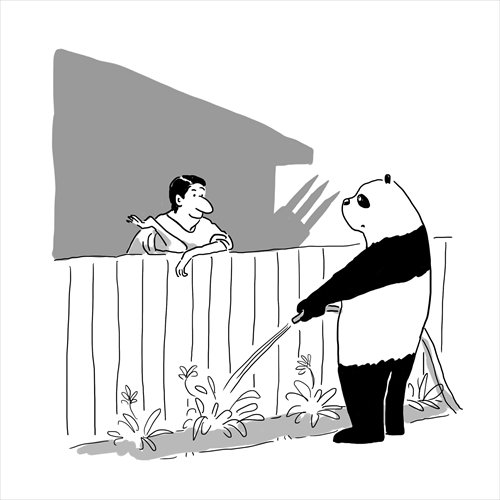HOME >> OP-ED
THAAD threatens return to Cold War thinking
Source:Global Times Published: 2016/7/12 19:00:49

Illustration: Liu Rui/GT
The Beijing-Seoul relationship has been under the spotlight in recent years, especially after Seoul announced Friday the deployment of the Terminal High-Altitude Area Defense (THAAD) system to counter a string of nuclear attempts by Pyongyang. Some scholars conjecture that while South Korea is under pressure to develop friendly ties with China, the latter has not shown enough support for the former on North Korea’s nuclear issues, which is to blame for the South Korean government’s decision to deploy the THAAD system.
Beijing has been consistent in its policies on the Korean Peninsula all these years, striving to maintain friendly ties with both Seoul and Pyongyang. It is Seoul that has misinterpreted Beijing’s diplomatic polices, wishfully thinking that as long as it builds an intimate relationship with Beijing, Beijing will keep a distance from Pyongyang. This zero-sum mentality is not what China pursues. Beijing endeavors to maintain stability and peace in Northeast Asia, to which good-neighborly relations with both North and South Koreas are a prerequisite. The Cold War mentality no longer meets the requirements of the 21st century.
The South Korean government has its own calculations on THAAD deployment. However, the defense system will bring more harm than benefits to Seoul if deployed. As well as being expensive, the THAAD system is not technologically strong and thus will not make much difference to South Korea’s security. THAAD, as a radar system, is expected to put local citizens’ health at huge risk, and thus has already met domestic protests even before being deployed.
More importantly, the missile defense system will definitely exert negative effects on the China-South Korea relationship, as Seoul knows. The Chinese side has explicitly aired its concerns and oppositions to the deployment of the system. With its monitoring scope going far beyond the defense needs of the Korean Peninsula and reaching deep into the hinterland of Asia, the THAAD system will pose a direct threat to China and other countries in the region.
However, Seoul is still showing high interests in deploying the system. Its real intention is to use THAAD as a bargaining chip to pressure China over North Korea’s nuclear issues. Fully aware that Beijing is unlikely to join it in countering Pyongyang, Seoul is thus taking advantage of THAAD to force the Chinese government to take a tough stance over the nuclear issues. South Korea’s calculations will not succeed. Beijing’s policy over the Korean Peninsula is made based on its own national interests and strategies, rather than those of Seoul’s.
Some believe that the special bonds and sentiments between Chinese and North Koreans, exemplified by Chinese’ participation in the Korean War, have played a significant role in China’s policies on South Korea. Beijing and Pyongyang share a time-honored friendship. However, the situation in Northeast Asia has seen dramatic changes since the end of the Cold War. The previously hostile relationship between Beijing and Seoul has developed into friendly and mutually beneficial ties during the past decades. In the modern times themed by cooperation, China endeavors to develop intimate relations with both Koreas.
China’s own national interests are prioritized in its diplomatic policies. Beijing is now focusing on modernization, and is pursuing stability and peace in the Korean Peninsula. However, Pyongyang’s efforts in developing nuclear weapons have put the peninsula’s and Northeast Asia’s stability at risk, and will harm China’s national interests. Despite the time-honored friendship with Pyongyang, Beijing will not and should not sacrifice its national interests for Pyongyang’s nuclear aspirations. Denuclearization in the Korean Peninsula is the political basis for the development of China-South Korea relationship.
Above all, China will not give in to South Korea’s THAAD threats, nor tolerate North Korea’s nuclear ambition. The Cold War mentality is outdated in today’s world, and China aims for good-neighborly relations with both Koreas.
The article was compiled by Global Times reporter Liu Jianxi based on an interview with Cui Zhiying, director of the Korean Peninsula Research Center at Tongji University.
liujianxi@globaltimes.com.cn
Posted in: Viewpoint